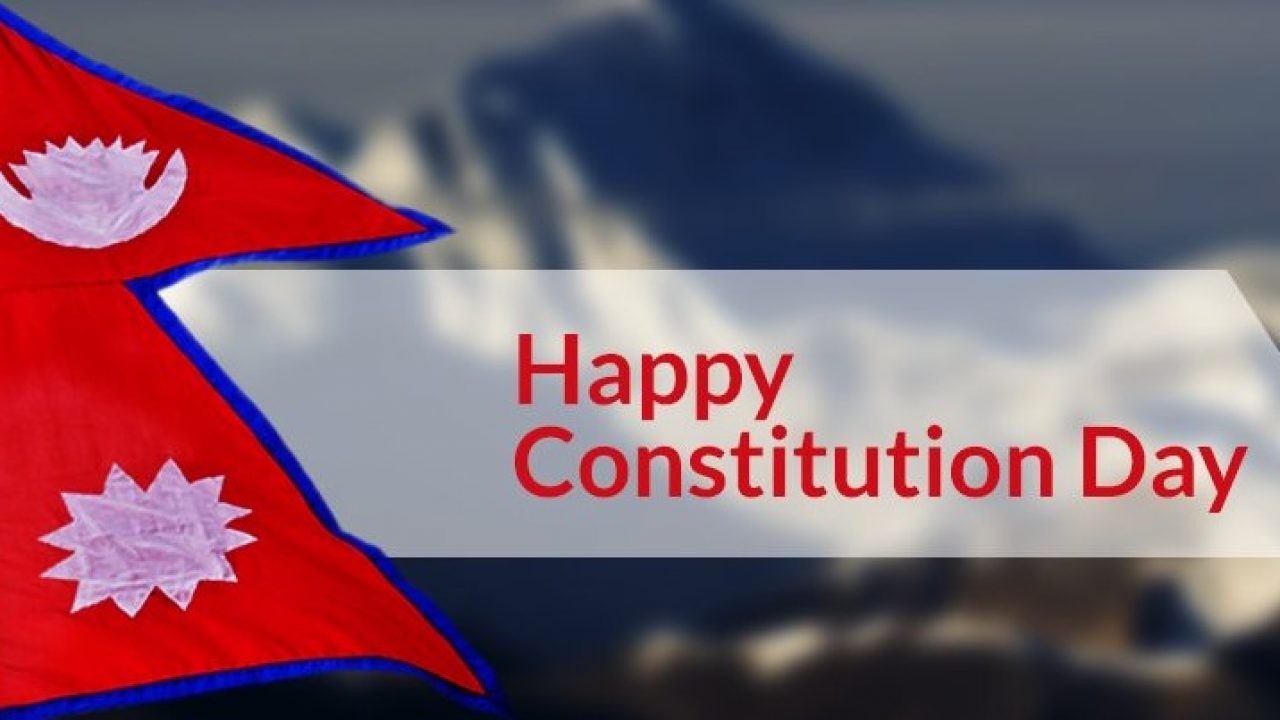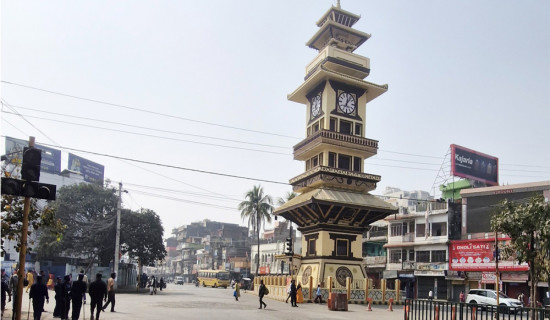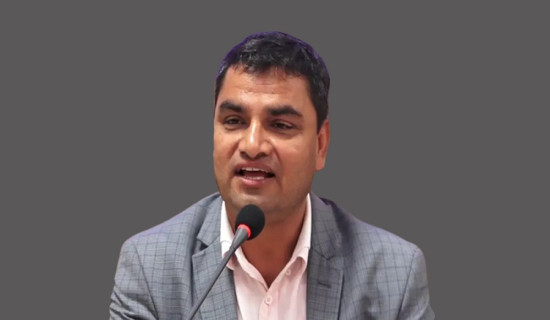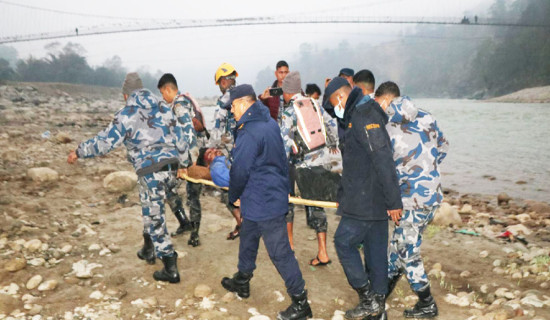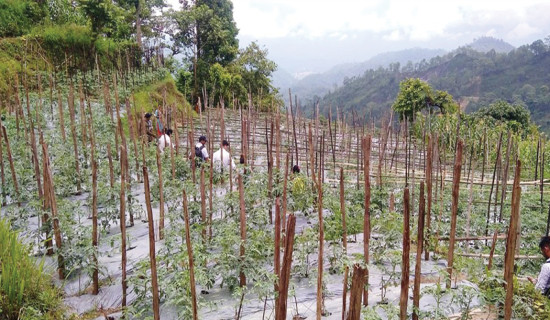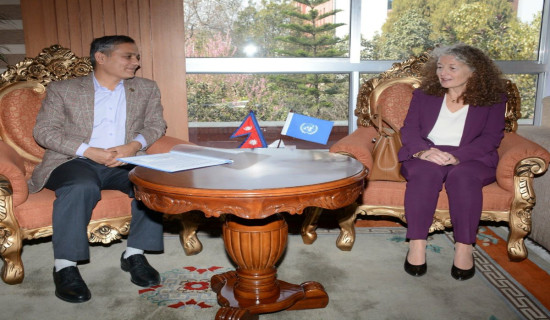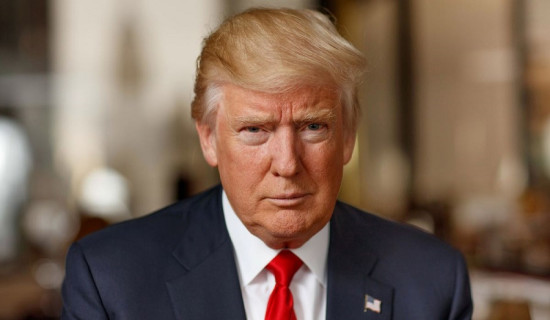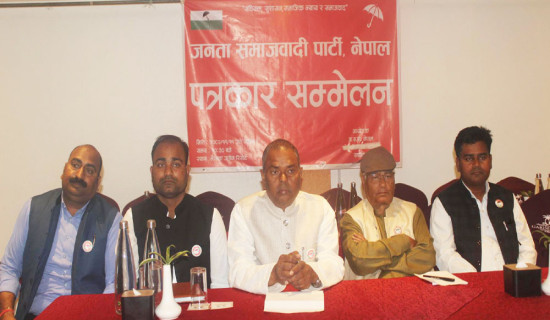- Monday, 23 February 2026
Ninth Constitution Day: Review of Constitution warranted from each angle, insist Constitution experts
By Narayan Neupane, Kathmandu, Sept 17: Nepal is observing the ninth Constitution Day on Thursday, September 19.
Amidst this context, constitutional experts and senior advocates have spoken of the need to review the country's main law from all perspectives.
Talking to National News Agency (RSS), they said it has been around a decade since the practice of the existing Constitution, adding that in a certain interval of time, the Constitution is supposed to be reviewed for sustainability. They have advised to consider the 'impracticability' of the Constitution and proceed with the revision for its 'maturity'.
The Constitution which is comfortably amendable will be durable, they said, advising the government to reflect on the voices of political parties for the Constitutional amendments.
Gopal Krishna Ghimire, President, Nepal Bar Association
He says the Constitution is an amendable document and it should revised as per the need of time accordingly. The Bar has already endorsed the proposal it received from its national conference for the constitutional amendment. The proposal highlights the need for restructuring of the judiciary and the Judicial Council, further empowering it, the provision of a dedicated Constitutional Bench, and ending the provision of holding a Supreme Court judge in the same office for long.
The situation is that the legislation is not active it has been supposed to be for drafting laws. The major responsibility of the legislation is to draft the laws as demanded by the Constitution. But the situation is something different. "It has been heard that the parliament drafted a single law throughout a year, despite that expectation of the drafting of various laws during one session of the House.
The issues of economic growth and other matters should be interpreted by connecting to the Constitution. It should be assessed based on the deliveries in the areas that the Constitution demands. We believe that it should be revised as per the needs of the citizens in a certain timeframe. We are giving feedback and advice to the government, parliament, and judiciary for the same.
It has also been heard in the public that justice has become expensive. In another hand, the provision of not being able to go for upper bodies for appeal if they are not satisfied with the verdict until paying fine and embezzled amount has raised question about the right of citizens to use the right of appeal. Industrialists and entrepreneurs have been mostly hit hard from it. The state should regulate them, not prohibit. They should be protected to make the country prosperous.
Nepal Bar Association has been providing advocating service to helpless. A total of 1,300 lawyers have been involved for the same. Implementation of court's verdict should be fast and there should be proper coordination and support of the executive in implementation of the verdict. All should stand at their respective places in course of implementing laws and there should be support and coordination between three-tier of governments. All three levels of the country should formulate similar type of laws.
There is a mechanism under leadership of deputy-mayor in local levels providing judicial rights. Minor disputes and clashes taking place in local level are settled there. There is no situation to knock the door of upper body. There is possibility of affecting justice if there is political biasness. So all should be clear and aware about it.
Eighteen high courts of the country including seven provinces should be developed as court of record and rights should be given to make final verdicts of some cases. It will help to reduce the pressure of cases if the Supreme Court. Good results could be yielded if the implementation level is made effective preparing capable human resources. The Nepal Bar has been saying that there should not be chief justice in the constitutional court. Role of Judicial Council and appointment of justice should be systematic. Parliament should be made effective reforming the election system. Attention should be paid on the issues raised from people's level to make election fair, impartial and economical in course of constitution amendment. Parliamentarian is the position connected with laws formulation and amendment. His/her main responsibility is to run the House continuously.
Laxman Lal Karna, former minister and constitutional expert
There was frequent change of governments when the constitution was being drafted. The parties came to a sort of understanding that the government should last its full term of five years. It was in this context that the provision of not bringing a no-confidence proposal against the Prime Minister for at least two years was included in the Constitution. However, the parties could not adopt that spirit.
The reformed parliamentary system is in practice in the country at present. Although the Prime Minister has the authority to dissolve parliament and there is provision for bringing a no-confidence motion against the Prime Minister in this system, the provision of not bringing a no-confidence proposal against the Prime Minister for the first two years was made with the intention of achieving a political stability so that the nation could be taken ahead towards prosperity.
The present constitution has envisaged many fundamental rights, which is rare in other world constitutions. The constitution also provides the workers the right to strike. There is provision of proportional representation, inclusiveness to address the nation's diversity. There is the provision of 33 per cent representation of women in all strata and entities of State. Women have large representation in all the three tiers of the government at present. This provision cannot be found in the constitutions of world's advanced democracies even to this day. They are striving to get to this provision.
Weaknesses in constitution
Although having such provisions in the constitution, there were certain weaknesses. The special rights of the indigenous nationalities, Madhesis, Dalits and Muslims, which was already owned by the constitution brought by the Interim Government formed on the back force of the people's movement, could not be included. The country adopted federalism, but the rights of the provinces were constricted. The distribution of powers was not as conceptualized in the Constitution. Most powers were concentrated on the centre. There was unnecessary delay in formulating the laws required for federalism, for example formulating the laws on province civil service and police.
The new provision for issuing citizenship to the offspring of the citizens by birth has only been recently introduced. Although this provision has addressed the problem to some extent, the topic of giving citizenship to a woman married to a Nepali citizen still remains.
Need for amendment
The constitution should be reviewed after a certain period in order to make it last long after drafting it from the Constituent Assembly. The impractical provisions of the constitution should be changed timely, as the same situation does not exist in the nation for ever. The constitution that can be easily amended will last longer. If we look at the constitution of India and the USA, there have been many amendments in them.
Even the constitution of Nepal before the present one was billed as the best of constitutions in the world, it did not last long as it was not amended in tune with the time. The present constitution should be made mature enough through timely amendment and the present government is formed in this backdrop.
Although everyone's ownership in the constitution is the ideal objective, the present government has the numbers to carry out constitution amendment as it enjoys near two-thirds majority.
The Loktantrik Samajbadi Party has some days back started discussions on constitution amendment and it also constituted a committee for the same. However, the modality and process of constitution amendment have not been made public. This topic needs to be discussed from now onwards.
We should remove the impractical provisions in the constitution assessing their practice over the last nine years.
There is need of constitutional reform to address the demands and aspirations of veracious classes and communities. Some shortcomings and incongruities in the present constitution should be removed. A review of the present constitution is inevitable in the context of the exercise of this constitution in the last nearly 10 years.
The constitution amendment should mainly address the following issues, among others: resolving the remaining issues related to citizenship, empowering the provinces, making the Vice President the Chairperson of the National Assembly, fixing the size of the provincial Council of Ministers as in the federal Council of Ministers and improving the judiciary.(RSS)

